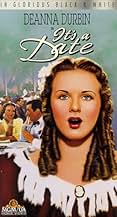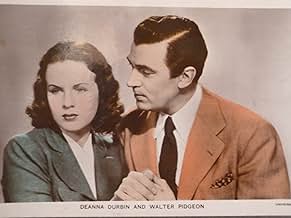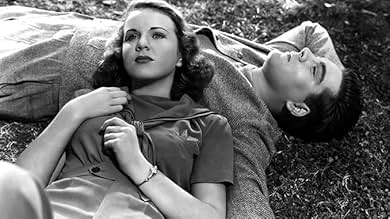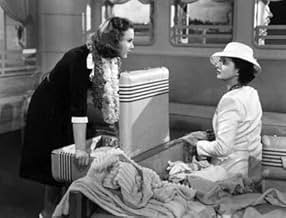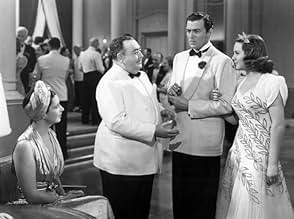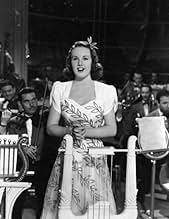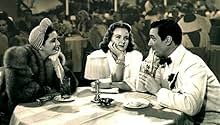Füge eine Handlung in deiner Sprache hinzuAn aspiring actress is offered the lead in a major new play, but discovers that her mother, a more seasoned performer, expects the same part. The situation is further complicated when they b... Alles lesenAn aspiring actress is offered the lead in a major new play, but discovers that her mother, a more seasoned performer, expects the same part. The situation is further complicated when they both become involved with the same man.An aspiring actress is offered the lead in a major new play, but discovers that her mother, a more seasoned performer, expects the same part. The situation is further complicated when they both become involved with the same man.
- Auszeichnungen
- 4 wins total
- Ship's Steward
- (Nicht genannt)
Empfohlene Bewertungen
This was the seventh movie Deanna Durbin made with producer Joe Pasternak and cameraman Joseph Valentine, and the well was running dry. This drivel would give anyone with an IQ above 70 a raging headache--even in 1940. It's a trite tale of a mother (Francis) and daughter (Durbin) in love with the same man (Pigeon) as well as mother and daughter vying for the same leading role in a Broadway play. It's nonsense with neither an ounce of plausibility nor a single bit of wit, though it fancies itself a comedy. The very contrived plot is arranged to provide Durbin with a ridiculous assortment of songs: "Musetta's Waltz" from La Boheme, Schubert's "Ave Maria," "Loch Lomond," and a bland new ballad, "Love Is All." Kay Francis was looking quite fine here, though the costume designer should have been shot for giving her unflattering turban hats.
This was the first American film that S. Z. "Cuddles" Sakall appeared in, though he didn't have his nickname at that time. He was playing the sort of part here that he played throughout his Hollywood career.
And the film reminded me of what an insipid actor Walter Pigeon was.
In Durbin's earlier films, I found her speaking voice high-pitched and a little annoying and her acting overly energetic to the point of being hyper. Here, she's delightful, bubbly without being manic, and she looks very pretty. Her singing voice has matured as well - she sings "Musetta's Waltz," "Ave Maria" and "Loch Lomond." The whole voice is richer though I will never be a fan of the way sopranos in those days were trained to back off of their high notes. She puts a little too much weight in the middle voice and therefore has a somewhat screechy Bb at the end of "Quando M'en Vo." Still, however, she is one of the best classical singers in film.
Though Durbin was a huge star at Universal, the studio never bought big properties for her. This is a nice film with good performances but that's about it. Kay Francis is lovely as Georgia and Loftus is funny as Sarah. The handsome Pidgeon does his usual good job.
Deanna Durbin in the end out-Garboed Greta Garbo, retiring at the age of 27 and moving to the outskirts of France, and I don't believe she's been seen since or even interviewed. The image and voice of the young girl live, and thanks to TCM, she undoubtedly has new fans. She deserves them.
When Durbin does get a chance to sing, she's great. She puts over all of her songs with professional skill and poise, doing an absolute standout job on "Ave Maria" and "Musetta's Waltz"--but the trouble is not enough time is spent on the vocals to showcase her amazing voice. Instead, we get Kay Francis and Walter Pidgeon falling in love while Deanna dreams up all sorts of schemes to keep her mother from knowing that she has won her mother's role in a play.
Deanna looks lovely at eighteen and has probably never been photographed more beautifully but this is the sort of vehicle that has you wishing the silly plot would move on so we can hear Durbin sing once more. Walter Pidgeon and Kay Francis are adequate in support. MGM later came up with a zestier technicolored remake called "Nancy Goes To Rio" with Jane Powell.
Trivia note: This was S.Z. Sakall's first screen appearance in an American film.
Wusstest du schon
- WissenswertesS.Z. Sakall's American film debut.
- PatzerWhen John Arlen enters Pamela's room with her dress, she is fixing her hair and a hand mirror is on the vanity table close to the table mirror. But on the next cut, the hand mirror has changed position and is now partially sticking over the edge of the table.
- Zitate
Karl Ober: I can't work in New York anyway. Is this place far from here?
Pamela Drake: Oh, no, Mr. Ober, it's only Maine. You know where Maine is!
Karl Ober: No.
Pamela Drake: Oh, it's practically a few minutes from here! You could write fine there.
Sidney Simpson: 'A few minutes'!
Pamela Drake: [to Sidney, blithely] Yes!
[to Ober]
Pamela Drake: That's all, really.
Karl Ober: [wagging his finger] Then it isn't quiet enough. I have to go further away from New York.
Pamela Drake: Oh, good - it *is* far away! Takes a whole day to get there.
[to Sidney, brightly]
Pamela Drake: Really, I'm an awful liar, aren't I?
Sidney Simpson: Yes.
- VerbindungenEdited into Gems of Song (1949)
- SoundtracksLove is All
(1940)
Music by Pinky Tomlin
Lyrics by Harry Tobias
Piano: Cecilia Loftus (uncredited)
Sung by Deanna Durbin (uncredited)
Top-Auswahl
Details
- Erscheinungsdatum
- Herkunftsland
- Sprache
- Auch bekannt als
- It Happened in Kaloha
- Drehorte
- Honolulu, O'ahu, Hawaii, USA(backgrounds)
- Produktionsfirma
- Weitere beteiligte Unternehmen bei IMDbPro anzeigen
Box Office
- Budget
- 867.000 $ (geschätzt)
- Laufzeit
- 1 Std. 43 Min.(103 min)
- Farbe
- Seitenverhältnis
- 1.37 : 1


